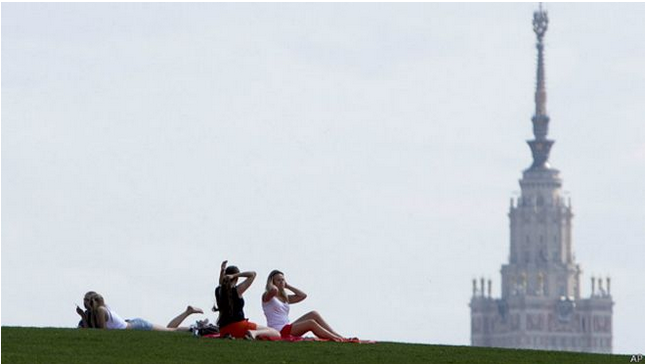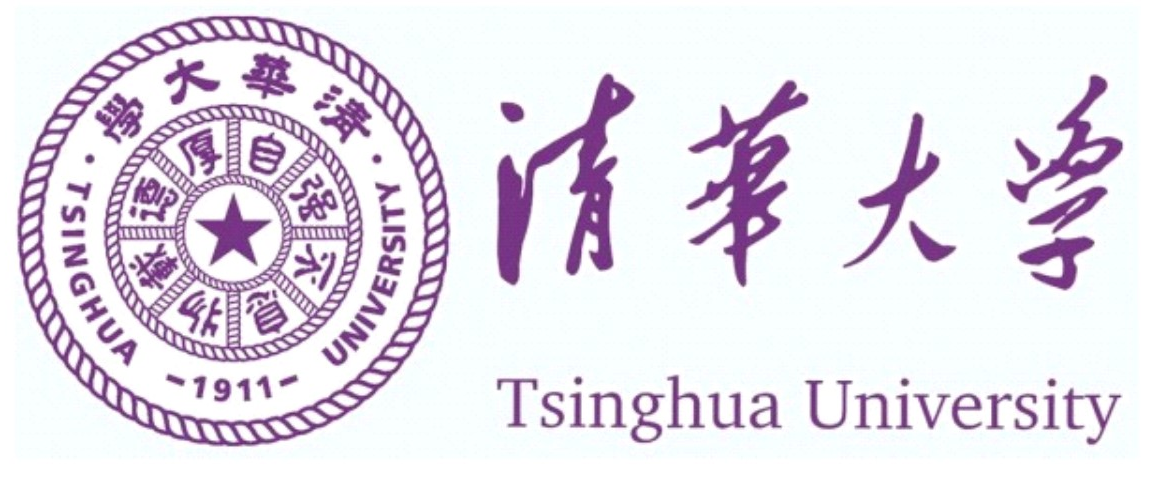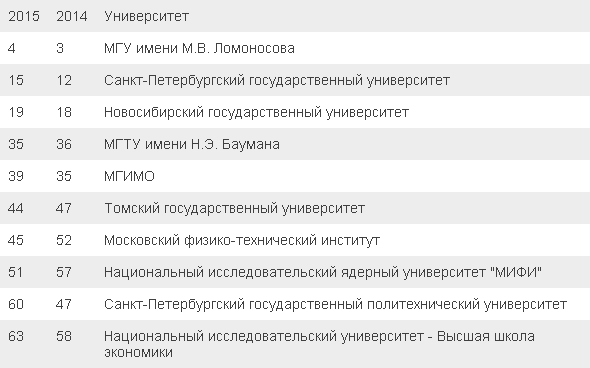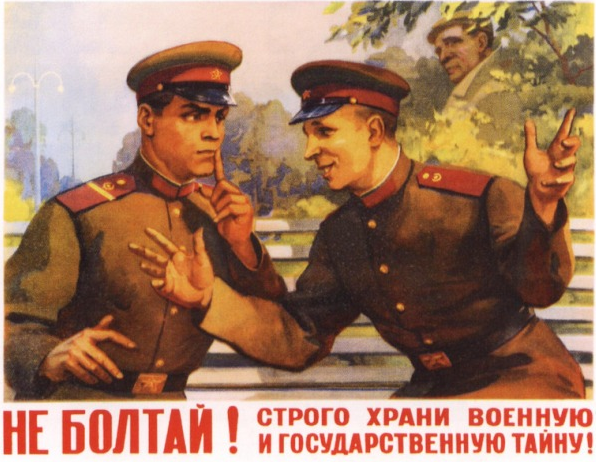Rating of universities of the BRICS countries. Russia is on the second place of honor. The liquidation of the fund "Dynasty" is dedicated to
Since, oddly enough, in GT there are no hubs for science and education, publish this article in the hub "The Future is here." Indeed, without these two components, there is no future for our country!

The other day came the regrettable, but expected news that Mr. Zimin made the final decision to liquidate his foundation. Foundation, which provided significant support to many Russian universities. In my opinion, this momentous event serves as a good reason to talk about how things are today with science and education in Russia, what prospects are visible and what foreign experience there is in this area. If time permits, I will try to publish a short series of articles on this topic and urge all those who are not indifferent to these problems to support my initiative by adding a sentence to the title of the articles: “Dynasty Dedicated Foundation Liquidation”
')
It so happened that the topic of the first article did not take long to choose. Most recently, a new ranking of educational institutions of the BRICS countries. Rapprochement with this group has recently become very acute on the agenda of our country. Let's leave global ratings alone for a while and see how we look against our new friends. Let us figure out which parameters taken into account when compiling the ratings help our universities to take high places, and which pull them down. Let's see how China looks on our background.
In order not to become an intriguer, I will say right away, while among other BRICS countries we look very decent, although we have already given the first place. Try three times to guess who.
The first three places of the ranking went to Chinese universities - Tsinghua University, Peking University and Fudan University. In the top ten universities - seven from China, and only one Russian - Moscow State University.

The leading Russian universities for the last year have deteriorated,but only slightly , compared with the past. So, MSU named MV Lomonosov dropped from third position to fourth, St. Petersburg State University moved from 12th to 15th place, Novosibirsk State University - from 18th to 19th.

However, in general, the trend is not catastrophic, moreover, despite some “slipping”, many Russian universities in the new rating of the BRICS countries have moved up, and most of the Top 100 have improved their positions compared to 2014.
Below is a table of rankings of 10 Russian universities, who took the highest places in the rating.

I especially want to be happy for my beloved MIPT, which seems to have shown the best dynamics!
The high places of the Russian universities, leaders of the rating, were due to such indicators as the ratio of student to faculty members, the proportion of employees with advanced degrees, academic reputation and reputation among employers.
However, today the situation with “internationalization" is very bad and, apparently, it will only get worse.
For example, MSU actually has the highest ratings in terms of academic reputation and the ratio of students to faculty members. However, according to the share of international employees of Moscow State University - on the 43rd place. By the number of published articles per teacher, and by the number of quotes for each one published article, the university is altogether in the second hundred.
In the first hundred, according to the citation index, only MEPI was among Russian universities.
Affects the national tendency to conduct and publish research, mainly in Russian.
The times when many studies were commissioned by the defense industry and for obvious reasons were not published in international journals seemed to be over, thebig question is how irrevocable , however, the “traditions” remain: university professors are mainly published in Russian scientific journals which are indexed in the Scopus database. However, the citation of articles placed in them, falls not only and perhaps not so much because of their quality. Such a banal reason as bad translations often fails.
The worst is the case with humanities journals, which are mainly published in Russian and are not indexed at all in international reference databases.
The citation and publication index accounts for at least 15-20% of any international or regional rating, and for Russian universities this indicator remains at a relatively low level, which pulls the overall rating down.

Another serious factor preventing our universities from taking high places is their closeness.
Russian universities are not in a hurry to talk about their own achievements to the whole world, thanks to which you can interest and attract students, colleagues, partners, companies for some financial projects. It is hard to say what the main role plays here - the mentality that has developed during the years of Soviet power, the fear of getting the stigma of a spy with all the ensuing consequences, or the banal poor knowledge of foreign languages.
The older generation of university workers often have English at a level that is not sufficient for writing publications, and young employees who are focused on active scientific work are not so many due to low salaries. In addition, it is quite difficult for young people to find a rate that provides monetary compensation for decent living conditions and the possibility of conducting qualitative research.
Another problem is that Russian scientists themselves refuse to express their opinions and act as experts in the preparation of world university rankings. So, this year, QS sent over 20,000 invitations to employees of Russian universities to take part in the survey as an expert in compiling a global ranking, but only about 600 scientists responded to the invitations.

The phenomenon of a large number of teachers with academic degrees, with a low quality of publications, is partly explained by the reasons revealed by the story of “Ddissernet”. Writing of candidate and doctoral theses and obtaining degrees has recently been put on stream. They were sold and bought. Officials hunted for degrees to flatter their vanity, and employees of scientific institutions to get at least some increase to their meager salary. It is known that a certain number of publications is necessary for obtaining a degree. It is not difficult to imagine the quality of the publications written by “literary blacks” for “purchased” theses. The reason why they are not in a hurry to publish in foreign scientific journals is also clear.
If you look at the dynamics of Chinese universities in global rankings over the past eight years, it is impossible not to notice that it is steadily rising. This process is not random. Simply for the government of the PRC in the field of education, the following tasks are priorities: improving competitiveness, exporting higher education, and building links with international universities.
According to the Organization for Economic Cooperation and Development, in 2012, China invested $ 294 billion in education, bypassing all countries, with the exception of the United States, with their $ 454 billion in education spending. Since then, China's spending on this article only steadily grow.
The Russian government also does not forget about universities. For example, this year it promised support in the amount of 10.5 billion rubles (184 million dollars) to improve its position in world rankings. The money will be distributed among the 15 Russian educational institutions selected during the competition.

However, the incredible difference in the amount of costs is only half the trouble. Even those more than modest money in the country’s budget allocated by the ministry reach the universities, usually half a year late, and you can only spend them on what you have written them for, while in many Chinese universities just like in the whole world practice, the university decides for itself what to spend this money on.
Until recently, at least in words, Russia claimed that we needed more foreign students, foreign professors. But at the same time, universities do not have enough hostels to accept them, the system of interaction with foreigners is not established, there is no moral readiness to work with foreign professors. After the American Kendrick White was dismissed from the post of vice-rector for innovation activities of Nizhny Novgorod State University named after N.I. Lobachevsky's situation in this area may change by no means for the better.
Let me remind you that Kendrick White’s dismissal happened after the Russian president expressed concern about the activities of foreign foundations, which, in his opinion, “applicants are taken directly from school, put on grants and taken away.”
What happened to Kendrick (White) will certainly have a very definite effect. First of all, among the scientists who considered Russia as a possible direction for potential work.
Actually, after these words, a final decision was made to close the Dynasty Foundation. In the recent past, the foundation allowed to promptly organize lectures of famous foreign scientists and send young people for short-term internships abroad, paying for their expenses. From now on, universities can only rely on state support. Unfortunately, it accounts for an insignificant share of the funds allocated by today's leaders of the two poles in the field of education - China and the United States. And worse, tends to decrease.
How long will Russia succeed in maintaining second place in the ranking of the BRICS countries with such trends? Wait and see.
PS I think many people have a question, why do I often touch on sharp and controversial topics in my articles, balancing on the verge of habrosucicide? Why do I spend a very expensive watch at my age of “golden autumn”, tearing them away from short nights in order to deliberately lower my karma?
I assure you, ladies, gentlemen and comrades, not at all because I do not love my Homeland or treat it with contempt. Perhaps I love her more than many of you. Then why?
Because I perfectly see how many great countries died, and the empires fell apart, primarily because they were divorced from reality . In different ways it was expressed in different cases. The Roman Empire was mired in debauchery not only moral, the Spanish drowned in looted goodness and attempts to preserve history, Hitlerite Germany was ruined by the idea of exclusivity. The great celestial empire had made huge sacrifices to get out of the self-isolation trap ...
I very much hope that my articles at least make someone think, and if our country is too disconnected from reality today and what the consequences may be. In the best way, in my opinion, this can be done by analyzing how similar and different are the approaches to solving various problems in Russia and other countries.

The other day came the regrettable, but expected news that Mr. Zimin made the final decision to liquidate his foundation. Foundation, which provided significant support to many Russian universities. In my opinion, this momentous event serves as a good reason to talk about how things are today with science and education in Russia, what prospects are visible and what foreign experience there is in this area. If time permits, I will try to publish a short series of articles on this topic and urge all those who are not indifferent to these problems to support my initiative by adding a sentence to the title of the articles: “Dynasty Dedicated Foundation Liquidation”
')
It so happened that the topic of the first article did not take long to choose. Most recently, a new ranking of educational institutions of the BRICS countries. Rapprochement with this group has recently become very acute on the agenda of our country. Let's leave global ratings alone for a while and see how we look against our new friends. Let us figure out which parameters taken into account when compiling the ratings help our universities to take high places, and which pull them down. Let's see how China looks on our background.
In order not to become an intriguer, I will say right away, while among other BRICS countries we look very decent, although we have already given the first place. Try three times to guess who.
British Quacquarelli Symonds Ltd. published a new - third in a row - ranking of universities of the BRICS countries: the list is dominated by Chinese universities. Russia is noticeably inferior to China, but only to him: in the top 200 rankings, China has 67 institutions of higher education, and Russia has 53. It is not difficult to see that in total the two countries occupy more than half of the places in this top
The first three places of the ranking went to Chinese universities - Tsinghua University, Peking University and Fudan University. In the top ten universities - seven from China, and only one Russian - Moscow State University.

The leading Russian universities for the last year have deteriorated,

Not so bad
However, in general, the trend is not catastrophic, moreover, despite some “slipping”, many Russian universities in the new rating of the BRICS countries have moved up, and most of the Top 100 have improved their positions compared to 2014.
Below is a table of rankings of 10 Russian universities, who took the highest places in the rating.

I especially want to be happy for my beloved MIPT, which seems to have shown the best dynamics!
The high places of the Russian universities, leaders of the rating, were due to such indicators as the ratio of student to faculty members, the proportion of employees with advanced degrees, academic reputation and reputation among employers.
However, today the situation with “internationalization" is very bad and, apparently, it will only get worse.
Problems of our universities
For example, MSU actually has the highest ratings in terms of academic reputation and the ratio of students to faculty members. However, according to the share of international employees of Moscow State University - on the 43rd place. By the number of published articles per teacher, and by the number of quotes for each one published article, the university is altogether in the second hundred.
In the first hundred, according to the citation index, only MEPI was among Russian universities.
Affects the national tendency to conduct and publish research, mainly in Russian.
The times when many studies were commissioned by the defense industry and for obvious reasons were not published in international journals seemed to be over, the
The worst is the case with humanities journals, which are mainly published in Russian and are not indexed at all in international reference databases.
The citation and publication index accounts for at least 15-20% of any international or regional rating, and for Russian universities this indicator remains at a relatively low level, which pulls the overall rating down.

Another serious factor preventing our universities from taking high places is their closeness.
Russian universities are not in a hurry to talk about their own achievements to the whole world, thanks to which you can interest and attract students, colleagues, partners, companies for some financial projects. It is hard to say what the main role plays here - the mentality that has developed during the years of Soviet power, the fear of getting the stigma of a spy with all the ensuing consequences, or the banal poor knowledge of foreign languages.
The older generation of university workers often have English at a level that is not sufficient for writing publications, and young employees who are focused on active scientific work are not so many due to low salaries. In addition, it is quite difficult for young people to find a rate that provides monetary compensation for decent living conditions and the possibility of conducting qualitative research.
Another problem is that Russian scientists themselves refuse to express their opinions and act as experts in the preparation of world university rankings. So, this year, QS sent over 20,000 invitations to employees of Russian universities to take part in the survey as an expert in compiling a global ranking, but only about 600 scientists responded to the invitations.

The phenomenon of a large number of teachers with academic degrees, with a low quality of publications, is partly explained by the reasons revealed by the story of “Ddissernet”. Writing of candidate and doctoral theses and obtaining degrees has recently been put on stream. They were sold and bought. Officials hunted for degrees to flatter their vanity, and employees of scientific institutions to get at least some increase to their meager salary. It is known that a certain number of publications is necessary for obtaining a degree. It is not difficult to imagine the quality of the publications written by “literary blacks” for “purchased” theses. The reason why they are not in a hurry to publish in foreign scientific journals is also clear.
China and Russia. Two countries - two approaches.
If you look at the dynamics of Chinese universities in global rankings over the past eight years, it is impossible not to notice that it is steadily rising. This process is not random. Simply for the government of the PRC in the field of education, the following tasks are priorities: improving competitiveness, exporting higher education, and building links with international universities.
According to the Organization for Economic Cooperation and Development, in 2012, China invested $ 294 billion in education, bypassing all countries, with the exception of the United States, with their $ 454 billion in education spending. Since then, China's spending on this article only steadily grow.
The Russian government also does not forget about universities. For example, this year it promised support in the amount of 10.5 billion rubles (184 million dollars) to improve its position in world rankings. The money will be distributed among the 15 Russian educational institutions selected during the competition.
Go Russia?

However, the incredible difference in the amount of costs is only half the trouble. Even those more than modest money in the country’s budget allocated by the ministry reach the universities, usually half a year late, and you can only spend them on what you have written them for, while in many Chinese universities just like in the whole world practice, the university decides for itself what to spend this money on.
Until recently, at least in words, Russia claimed that we needed more foreign students, foreign professors. But at the same time, universities do not have enough hostels to accept them, the system of interaction with foreigners is not established, there is no moral readiness to work with foreign professors. After the American Kendrick White was dismissed from the post of vice-rector for innovation activities of Nizhny Novgorod State University named after N.I. Lobachevsky's situation in this area may change by no means for the better.
Let me remind you that Kendrick White’s dismissal happened after the Russian president expressed concern about the activities of foreign foundations, which, in his opinion, “applicants are taken directly from school, put on grants and taken away.”
What happened to Kendrick (White) will certainly have a very definite effect. First of all, among the scientists who considered Russia as a possible direction for potential work.
Actually, after these words, a final decision was made to close the Dynasty Foundation. In the recent past, the foundation allowed to promptly organize lectures of famous foreign scientists and send young people for short-term internships abroad, paying for their expenses. From now on, universities can only rely on state support. Unfortunately, it accounts for an insignificant share of the funds allocated by today's leaders of the two poles in the field of education - China and the United States. And worse, tends to decrease.
How long will Russia succeed in maintaining second place in the ranking of the BRICS countries with such trends? Wait and see.
PS I think many people have a question, why do I often touch on sharp and controversial topics in my articles, balancing on the verge of habrosucicide? Why do I spend a very expensive watch at my age of “golden autumn”, tearing them away from short nights in order to deliberately lower my karma?
I assure you, ladies, gentlemen and comrades, not at all because I do not love my Homeland or treat it with contempt. Perhaps I love her more than many of you. Then why?
Because I perfectly see how many great countries died, and the empires fell apart, primarily because they were divorced from reality . In different ways it was expressed in different cases. The Roman Empire was mired in debauchery not only moral, the Spanish drowned in looted goodness and attempts to preserve history, Hitlerite Germany was ruined by the idea of exclusivity. The great celestial empire had made huge sacrifices to get out of the self-isolation trap ...
I very much hope that my articles at least make someone think, and if our country is too disconnected from reality today and what the consequences may be. In the best way, in my opinion, this can be done by analyzing how similar and different are the approaches to solving various problems in Russia and other countries.
Source: https://habr.com/ru/post/367621/
All Articles